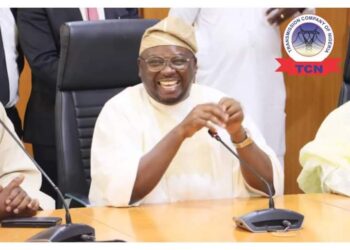Nigeria’s power sector was embroiled with several challenges in the year gone by, and with 2024 beckons the need to turn the fortunes of the sector around. In this report, analysts set agenda for the power minister, Adebayo Adelabu, as 2024 kicks-off
A cross-section of stakeholders in the electricity sector of the economy has advanced the need for stronger collaboration that would lead to new investment directions toward the rejuvenation of the power sector.
The stakeholders in their separate reviews of the power sector for 2023 posited that collaboration and investments remain key factors to tackling Nigeria’s electricity challenges.
Chairman of the Customer Consultative Forum of Festac/Satellite Town, Lagos state, Dr. Akinrolabu Olukayode, said the power sector in 2023 had been quite eventful, but also ladened with hydra-headed challenges.
Olukayode said for the first time in the history of Nigeria, the sector experienced a total collapse of the national grid, adding that the man-made challenges had been multi-faceted.
According to the consumer boss, the year 2024 is expected to be more promotional than the outgoing in terms of increased capacity from the dwindling 3,000MW to 14,000MW and 40,000MW, respectively.
“I expect every customer on the network of each disco to be metered digitally. I expect frantic renewal and replacement of obsolete installations engendering frequent and incessant collapse,” he explained.
Olukayode, who is also a lecturer at the Lagos State University, Ojo, advised the government to focus on providing a soft landing for customers through subsidy of meter procurement.
Equally, he advocated a moratorium on Discos through the Central Bank of Nigeria to enable them to procure electrical equipment.
He pleaded that the government should put a ceiling on energy tariffs and intensify efforts on prosecuting energy theft offenders.
Describing the value chain (GenCos, Transmission, and DisCos) as a novel idea but observed that it was established on faulty foundations.
“The commencement of the value-chain did not take cognizance of improving on the existing installation thresholds; evaluate the capacity, thereby using it to project improvement while engaging in guided operations.
“The assessment and evaluation of the national grid and other attendant installations for the commencement of the value chain was shoddy and haphazard. That gave rise to the incessant collapse experienced this year.
“The reporting system from the available database is always manipulated for selfish reasons away from national interest.
An independent body, preferably expatriate, should be allowed to do an independent assessment of our national grid to determine the area of strength and weaknesses,” he advised.
Olukayode said the statistics, structure, landmark, and density from the previous regime, which the value chain was built on were inaccurate, hence, inadequacies of coverage.
He advised that a scientific enumeration be carried out for hitch+free operation.
Olukayode commended the performance of the power sector, which he described as encouraging, suggesting that it could still be improved upon.
“I can only suggest as aforementioned that the statistics be re-worked to ensure accuracy in data and information systems to enhance service delivery.
“Government policies through the Nigerian Electricity Regulatory Commission (NERC) have been sequel to reports and observations in operational activities. It is another way of saying that it is proactive,” he noted.
Hope for improvement?
For his part, an electricity market analyst, Mr Lanre Elatuyi, said the Nigerian power sector had been eventful in the outgoing year, although, with expectations of improvement in the coming year.
Elatuyi said the sector’s reliability and excellent customer service are still far from being achieved.
According to him, it has been an eventful one because Electric Power Sector Reform (EPSRA) 2005 was repealed, and Electricity Act 2023 was enacted.
“The contradictory provisions in the Act have elicited debates among sector experts and stakeholders, and the conversations are ongoing, especially the provision for the establishment of State Electricity Markets.
“Another important landmark this year in the power sector is NERC’s guideline for Secondary Escrow Account Management for Bilateral Transactions, which provides an arrangement by which DisCos may directly enter bilateral transactions with GenCos.
“So, three Discos, namely Ikeja, Eko, and Abuja, were mandated to initiate bilateral contracts with GenCos as a precursor to market transition to the wholesale competitive electricity market referred to as Medium-Term market in NESI.
“Average daily generation is still about 4,500MW, and available capacity is still around 6,400MW. DisCos load off-take is barely 4,000MW, and ATC&C loss is still over 40 percent industry average.
“The metering gap has not been substantially bridged, and the liquidity issue persists. The challenges are still there, and we can only hope that 2024 will be a better year for the sector,” he said.
Elatuyi said power sector challenges are as many as anyone could imagine, adding that there are challenges of gas availability and the delay in implementing the gas network code.
“There are unsettled debts owed gas suppliers, and gas sales to GenCos are on the best endeavour basis. Many generation plants are out due to maintenance issues because invoiced energy sales were never settled by the market.
“We are now faced with resource adequacy issues as available capacity is dwindling. We have issues around power generation dispatch and economic merit orders which impact wholesale electricity price. Power purchase agreements are not fully active, and even the partial activation agreement initiated over a year ago has failed to achieve the target set.
“Settlement of NBET’s invoice remains a big challenge, making some power generation companies struggle to meet their obligations to their lenders, carry out maintenance, and even pay salaries.
“At transmission, we have challenges around the interface between GenCos and TCN and between TCN and Discos. We have issues of reliability with constant frequency excursions outside nominal values and voltage out the allowed thresholds. There is still no real-time grid visibility because we have no SCADA.
“Transmission loss factor is still high, and the grid remains unstable, unreliable, and constrained despite boasts of capacity expansion by the grid operator,” he said.
He added that “at distribution, the ATC&C loss is still very high. The DisCos are not bankable, hence, less access to capital for capacity expansion.
“The metering gap is still huge, and DisCos have no financial means to procure meters. The issue of cost-effective tariffs is a never-ending one as assumptions in the Multi-Year Tariff Order (MYTO) methodology for setting tariffs are always at variance with market realities
“So, the challenges are many and I am not sure how the government intends to address these challenges. This is a regulated industry, and the regulator must be given the needed independence to do their work.
“The government’s role is in policy setting and the policy objectives must then be complimented with market design that will ensure reliable, affordable, and sustainable electricity supply to Nigerians.
“The new Electricity Act does not have a policy underpinning it. Though the Act provides that the Minister of Power should within a year come up with an integrated national policy, we can only wait and see if something will come up in the first quarter of 2024.
Listing on stock exchange
On his part, the President of the Network for Energy Reforms, Mr. Olubiyo Kunle, said the entire 100 percent equity stake-holding of the generation, transmission, and distribution component should be publicly listed on the floor of the Nigerian Capital Market/Stock Exchange.
Kunle said the present dominance of individuals, holding shares through third parties and shares by proxies should be discouraged.
He said the present equity stake-holding of the present investors should be diluted by way of even the spread of the share capital vis-a-vis public subscription.
“At no point in time has there been any Public Notices Advertising Initial Public Offering (IPOs). If and when the government decides to do the needful, there will surely be a paradigm shift”, he said.
He said the process must be bench-marked and standardized in a way that only financially and technically qualified entities are allowed to participate and hold equity.
“We can reduce the highest per block equity stake of the present investors to 10 percent per individual group/ block equity stake-holding. And the remaining equity stake-holding/equity structure could be from public subscription.
“Government in the immediate and medium and long-term may have to disinvest or dilute her stakes and concentrate strictly on the regulatory Ecosystem. The present arrangement is more or less like a diarchy or a mixed bag of public/private equity.
“Budgets are over-bloated, and the primary objectives aren’t to promote market competition nor are they promoting a competitive electricity market. The current arrangements are tailored to rent-seeking and market monopolistic profiteering,” he added.
Kunle said moving forward, an individual or business group/entity should not be allowed to own more than 10 percent equity stake-holding.
He said the government through the SEC, capital market, and Nigerian Stock Exchange set out and enforced strict corporate governance benchmarks.
“There are lots of incentives for corruption and vested interests whose only objectives are how to keep the present arrangements in place as a cash flow. There is nothing that we need to say that we haven’t said over time.
The Nigerian government and Nigerians know what to do if and when we are practically ready to do the needful,” he added.
In the view of Mr. Simon Andrew, Managing Partner, Safe Renewable Energy Ltd., there are mounting concerns as Nigeria’s power privatization process was expected to lapse on October 31, 2023.
Andrew said this has become more problematic following the decade-long crisis within Nigeria’s power sector.
According to him, for over 62 years, the country’s electricity value chain, from distribution to generation and transmission, has been bedevilled with challenges.
“Meanwhile, the government attempted to break the jinx in the country’s ailing power sector, first with the establishment of the defunct 2005 Electric Power Sector Reform (EPSR) Act, then on November 1, 2013, the commencement of the privatization process.
“Government commenced the privatization of the Nigerian electricity distribution and generation companies in November 2013, benchmarked on a 10-year moratorium of operational licenses with the hope that the decision would halt the age-long power crisis.
“However, a decade later, the problems of the power industry have remained unsolved, becoming a persistent clog in the wheel of progress for Nigeria’s economy.
“The electricity distribution companies are battling with liquidity issues and low remittance compounded by the metering gap; still, the generation companies struggle with poor investment and transmission inadequacies, leading to incessant grid collapses. For years, the country has struggled with 5,000 megawatts of electricity for a population of over 200 million people.
Source: NAN




